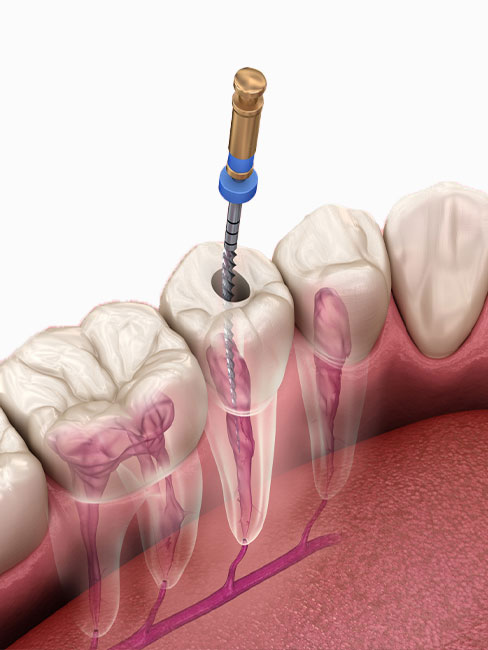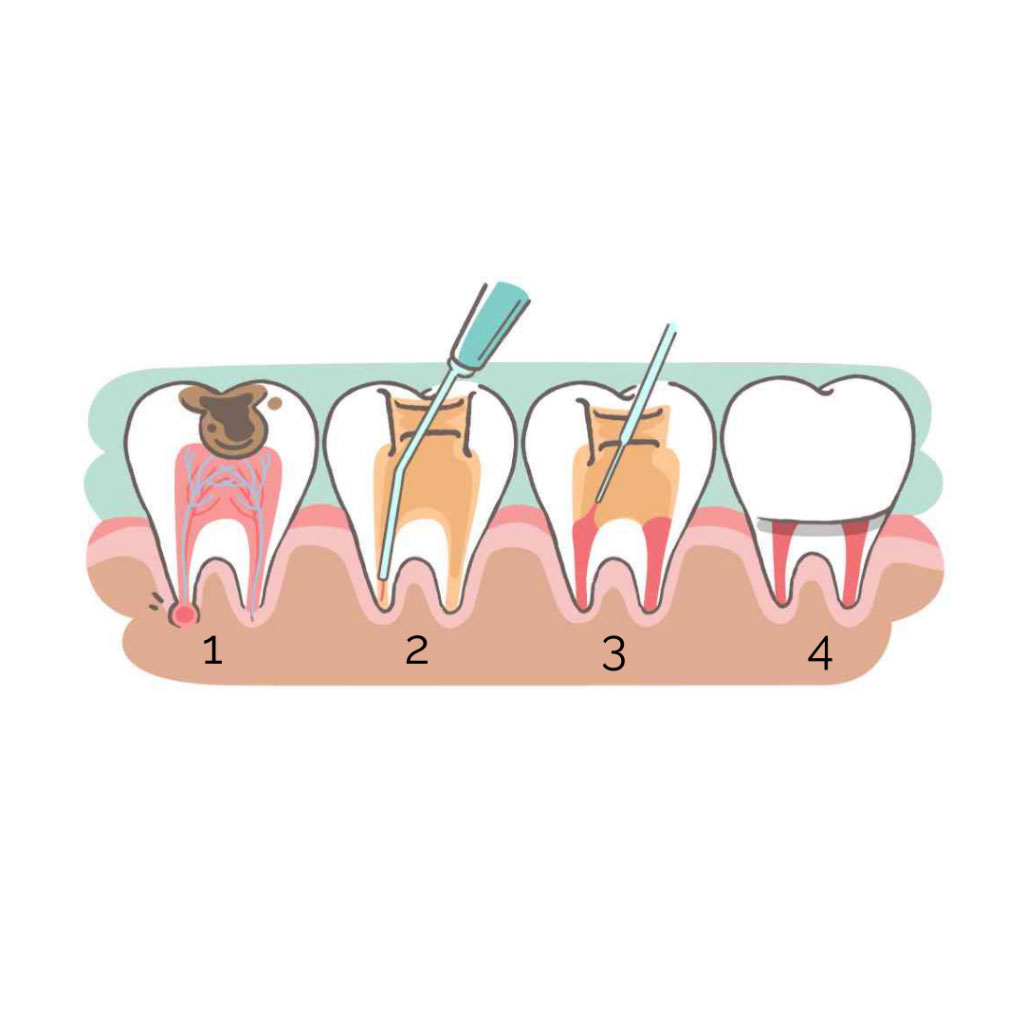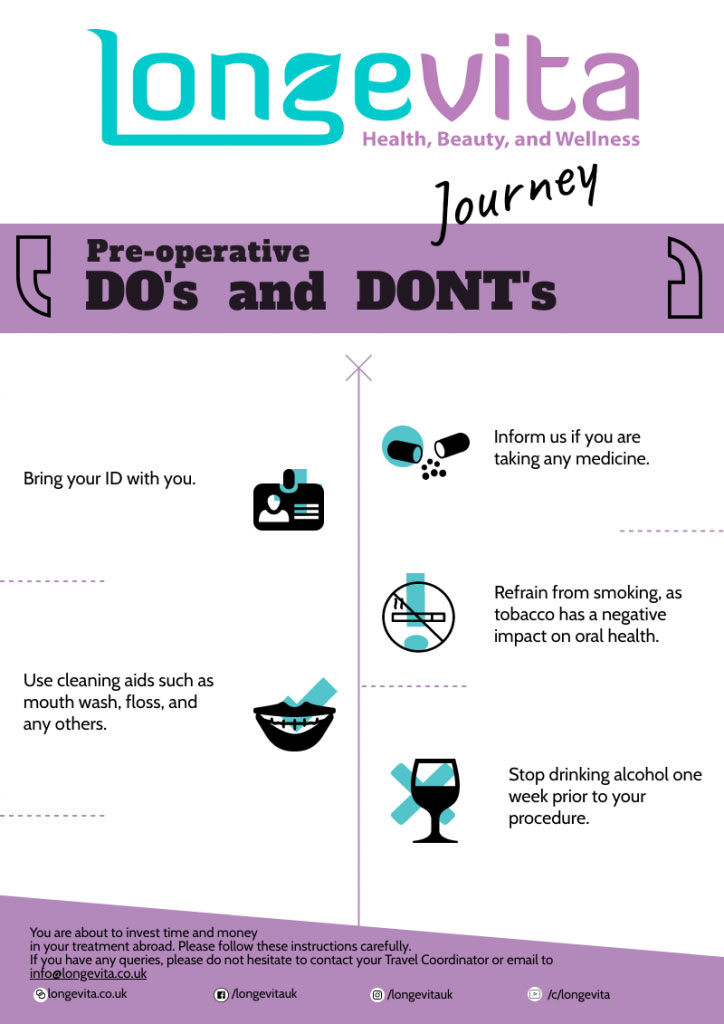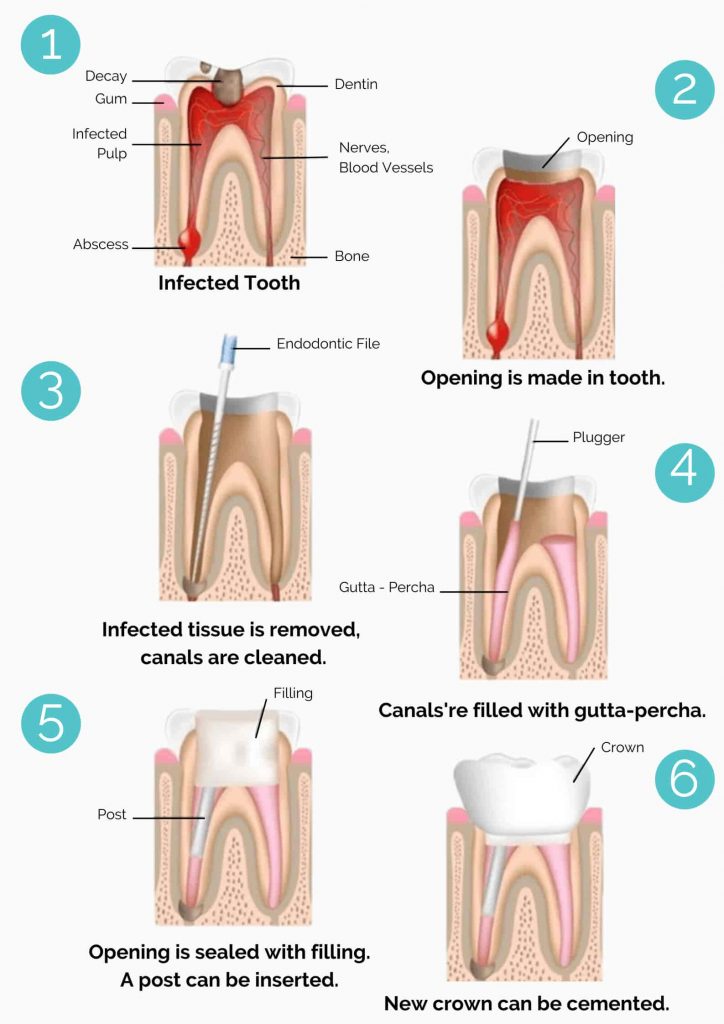A root canal is a dental procedure involving the removal of an infected or inflamed pulp to prevent the extraction of the entire tooth.
In 90-95% of the cases, this treatment leaves the patient with a normally functioning tooth.
What Is Root Canal Treatment?
A root canal treatment involves removing the pulp from the hollow cavity that extends from the crown to the bottom of a tooth’s root.
After the removal of the pulp, the tooth stays in place because it’s anchored to the jaw by a cement-like coating surrounding the tooth root.
A tooth consists of an outer layer of hard enamel and a softer layer of dentin underneath. Further down is the pulp, which contains tissue, blood vessels, and nerves.
This provides nourishment to the tooth while it’s still developing and growing.
After it is fully developed, nourishment can come from the surrounding tissues. Therefore, the pulp can be removed if it has become a health concern.
Tooth pulp can get infected due to the following reasons:
- Deep tooth decay
- Filling leak due to fracture
- Physical trauma to the pulp
- Broken tooth
- Multiple dental treatments
- Bruxism
- Gum disease
It’s important to note that any kind of opening (crack, fracture, cavity) on the surface of the tooth can allow bacteria in the mouth to enter the cavity resulting in an infection.
When left untreated, the infection can spread to the surrounding tissues, cause an abscess, and even lead to tooth loss.

How Much Is Root Canal In Turkey?
On average, the root canal treatment cost in Turkey is £50-£60 per tooth.
It’s cheaper than getting a root canal in the UK or US. And it’s mainly so because of the currency exchange and the cost of living in Turkey.
Here’s a comparison of the cost of root canal treatment in different countries:
| Country | Cost/Tooth |
| US | $1,000 (between $200-$600 w/ insurance |
| UK | £100 to £1,000 (£70.70 on the NHS) |
| Australia | $1,000 to $2,500 |
| Turkey | £50-£60 ($60-$75) |
An added benefit of getting a root canal in Turkey is that patients are offered all-inclusive treatment plans with accommodation, transfers, anaesthesia, medication and aftercare.
Still, keep in mind that root canal treatment prices with us can vary depending on the location of the tooth and the number of canals being treated:
- Root Canal (One Canal) – £60
- Root Canal (Two Canals) – £100
- Root Canal (Three Canals) – £150
- Root Canal (Four Canals) – £175
Additionally, any filling or restoration will not be included in the root canal treatment cost.
Why Do You Need Root Canal Treatment?
These are the signs you need this surgery:
Pain: If your tooth pulp is infected, you’d experience pain when biting or chewing foods. The consumption of hot or cold foods will also result in pain.
Loose Tooth: One indication of damage to the tooth roots is the tooth becoming loose.
Swelling: The infection itself results in swelling of the gum. Your cheeks and jaw can also get swollen. The pressure from this can cause more pain.
Pus: Drainage from the affected tooth is another indication of bacterial infection.
Boils: The abscess results in the formation of swollen bumps that look like pimples.
Sensitivity: Your teeth will feel sensitive to hot and cold temperatures. It can persist even when you’ve stopped their intake.
Darkening Tooth & Gums: The bleeding from the pulp can discolour the tooth. It will also darken the gums as the infection spreads.
Am I Suitable For Root Canal Treatment?
What To Think About Before You Have A Root Canal?
When getting this procedure, you should ask your dentist about their training, licensing, and experience. Inquire about the clinic itself, and whether it is registered.
Other than that, you should learn about the procedure itself, possible complications, duration of recovery, and aftercare.
You should also consult the dental surgeon on the additional treatments that you’ll need, like tooth filling or dental crowns.

How Best To Prepare For Root Canal Treatment In Turkey?
Before heading to the clinic for your tooth root canal, you should inform the dentist about any medications that you’re taking and your health condition.
Other than that, make sure to brush your teeth before the dental appointment.
Lastly, you’d have to refrain from smoking and drinking alcohol a few days before the root canal therapy.

What Is The Procedure For Root Canal In Turkey?

A root canal is an invasive procedure. After you come into the clinic, the dentist will perform a physical examination. It’s also possible that a root canal X-ray is taken.
This will not only show the infected pulp but also give an idea of the amount of filling material that’s going to be used. For the procedure itself, the following are the root canal treatment steps:
- Local anaesthesia is given so you don’t feel any root canal treatment pain.
- The dentist will place a thin rubber sheet in your mouth to isolate the infected tooth, keeping it protected from other infectious agents in the mouth.
- The crown of the tooth is drilled to create an opening leading to the pulp.
- The infected pulp is removed from the opening, and the canals are filled with a disinfectant solution.
- Once it’s clean, the canal is filled with plant-based gutta-percha.
Filling or Crown Restoration
After filling the canal, the dentist places a crown or moulds the tooth structure with filling material. This is the last of the root canal treatment stages.
A crown or filling is necessary because after the pulp is removed, the tooth starts to discolour, which causes aesthetic problems, especially if it’s a root canal on a front tooth.
Other than that, the lack of coverage can cause more oral health complications (infection, fracture), which is why a root canal crown is placed.
How Long Does Root Canal Treatment Take?
A root canal procedure takes anywhere from 30 minutes to 1 hour. It depends on the tooth itself since the number of roots can vary.
All the steps involved in a root canal treatment procedure can be completed in 1 visit, but usually, it takes 2 or more.
On the second visit, further cleaning of the tooth takes place, which is covered with a temporary filling in the meantime.
A molar root canal can take longer because it has three roots, with each root containing multiple canals.
If you have more than one appointment, each would approximately take the same amount of time.
Book A Free Consultation With Our Patient Consultants
We offer free consultations for patients across the UK & Ireland, so you can discuss your individual requirements with our specialists. Book A Free Consultation With Our Patient Consultants Today.
Recovery And Results Of Root Canal
During the procedure, you’re likely to feel sore in the treated area. This can last for a few days.
You may also experience pain for which the dentist will prescribe painkillers.
You may also need an antibiotic in some cases.
The whole root canal recovery time should be less than 1 week, as most of the side effects resolve in a few days.
Your root canal results should last a lifetime. According to the NHS, in 9 out of 10 cases, the tooth can survive for a decade after the root canal surgery.
Aftercare Of Root Canal Treatment
Immediately after the surgery, you should avoid eating any foods as long as you’re numb so that you don’t end up biting your cheeks or tongue.
Also, try eating from the other side of the mouth. Make sure to avoid foods that are too hard.
For aftercare, it’s important that you take good care of your oral health. You need to brush, floss, and use mouthwash.
After the removal of the nerves in the tooth pulp, you won’t feel any pain even if the tooth gets infected. So, you need to make sure that you don’t get yourself into that situation.
For this, regular dental checkups are also important. Moreover, you need to avoid smoking for a while as it can slow down the healing.
Other than that, do not consume any sweet, sticky, acidic foods as they can harm your teeth.
Side Effects to Expect After Root Canal Treatment
Numbness can occur for a few hours after the treatment, along with discomfort, which can last for days. You may experience pain for a week after the surgery.
The pain after a root canal is common and should be treated with painkillers.
However, if you experience severe throbbing pain, there may be an issue with the cleaning of the canal or filling (cracks), in which case you should consult your doctor.
The pain may also occur in the jaw because you have to keep it open for a long time during the surgery.
This can last for a few days, but it should get better. If you had a crown placed at a later appointment, the placement too can result in temporary pain.
What Could Go Wrong After Root Canal?
You may experience the following after this procedure:
Root Canal Infection
Infection is a risk of every surgical procedure (in which the skin is cut), and it’s possible that a root canal infection can occur even after the surgery has taken place.
Left untreated, the infection can spread, and you can end up with an abscess. If you notice the following signs of the infection, get in touch with your doctor:
- Oozing pus
- Redness
- Swelling
- Warmth
- Bad breath
Root canal infection can be due to different reasons. A canal’s shape can make it difficult to thoroughly disinfect it.
It is also possible for a tooth with more than one canal to contain bacteria that can cause a root canal infection.
The bacteria in their curvatures might go undetected. In addition, bacteria can enter the tooth if you don’t get a filling or crown fitted.
Cracked Tooth After Root Canal
Root canal cracked tooth is another complication of the procedure. There are different reasons for these fractures: hard foods, teeth grinding, and poor oral hygiene.
These cracks are so small in size that you might not notice them at all. However, they cause pain and sensitivity.
You might even feel pressure when you’re consuming food. If this is the case, make sure to get help as soon as possible.
In case it is too late to save your teeth, you may need an extraction followed by additional dental treatments like implants.
What To Do If You Have Problems After A Root Canal?
If you’re experiencing any problems during the root canal recovery, you should get in touch with the Aftercare team online.
They will get in touch with your root canal dentist for an assessment.
You can also open a ticket in the Support Portal and get further information on recovery from the post-operative guides available there.
Other Procedures to Have With A Root Canal
When getting a root canal, most people get crowns or fillings with it so that the tooth is protected from damage or infection.
It is also common among patients to get composite bonding with the root canal to address minor aesthetic problems.
Alternatives to Root Canal Treatment
In some cases, the dentist recommends tooth extraction instead of a root canal. It happens when the tooth is too badly damaged.
In between root canal or extraction, it’s better to have a root canal since it conserves more of the tooth structure. The following are the differences between the two procedures:
| Root Canal | Tooth Extraction | |
| Procedure | Removing infected pulp to save the tooth structure | Extracting the entire tooth because it’s too far damaged and cannot be repaired with a crown or filling on the existing structure |
| Surgical Time | Less than an hour but depends on the number of teeth | Less than an hour but depends on the number of teeth |
| Pain | None. Local anaesthesia is used. | None. Local anaesthesia is used. |
| Visits | Maybe more than 1 (excluding follow-up) | Usually 1 (excluding follow-up) |
| Recovery | Less than a week | 2 weeks |
FAQ
Do root canals hurt?
Because of the use of local anaesthesia during the surgery and painkillers after, root canals do not hurt. At most, you can feel discomfort.
Can I eat after a root canal?
You should wait to eat until the numbness after the root canal goes away. Also, it’s advised to eat only soft, mushy foods like bread, eggs, yoghurt, mashed potatoes, applesauce, broths, and baked beans.
Can I brush my teeth after a root canal?
You can brush your teeth after a root canal unless advised otherwise, but be careful around the treated area.
What will my tooth look like after the treatment?
If you have gotten a crown or filling after canal treatment, your tooth should blend in naturally with your surrounding teeth. However, if you haven’t, you might notice the tooth getting grey or dark.
How long can I wait to get a root canal?
Once your doctor has recommended that you should get the surgery, you should get it as soon as possible.
That’s because the infection from the pulp can spread to the tissue and teeth. This will require extensive dental repair, which will be much more expensive and difficult.
Reviewed and approved by Dr. Izbel Aksit.